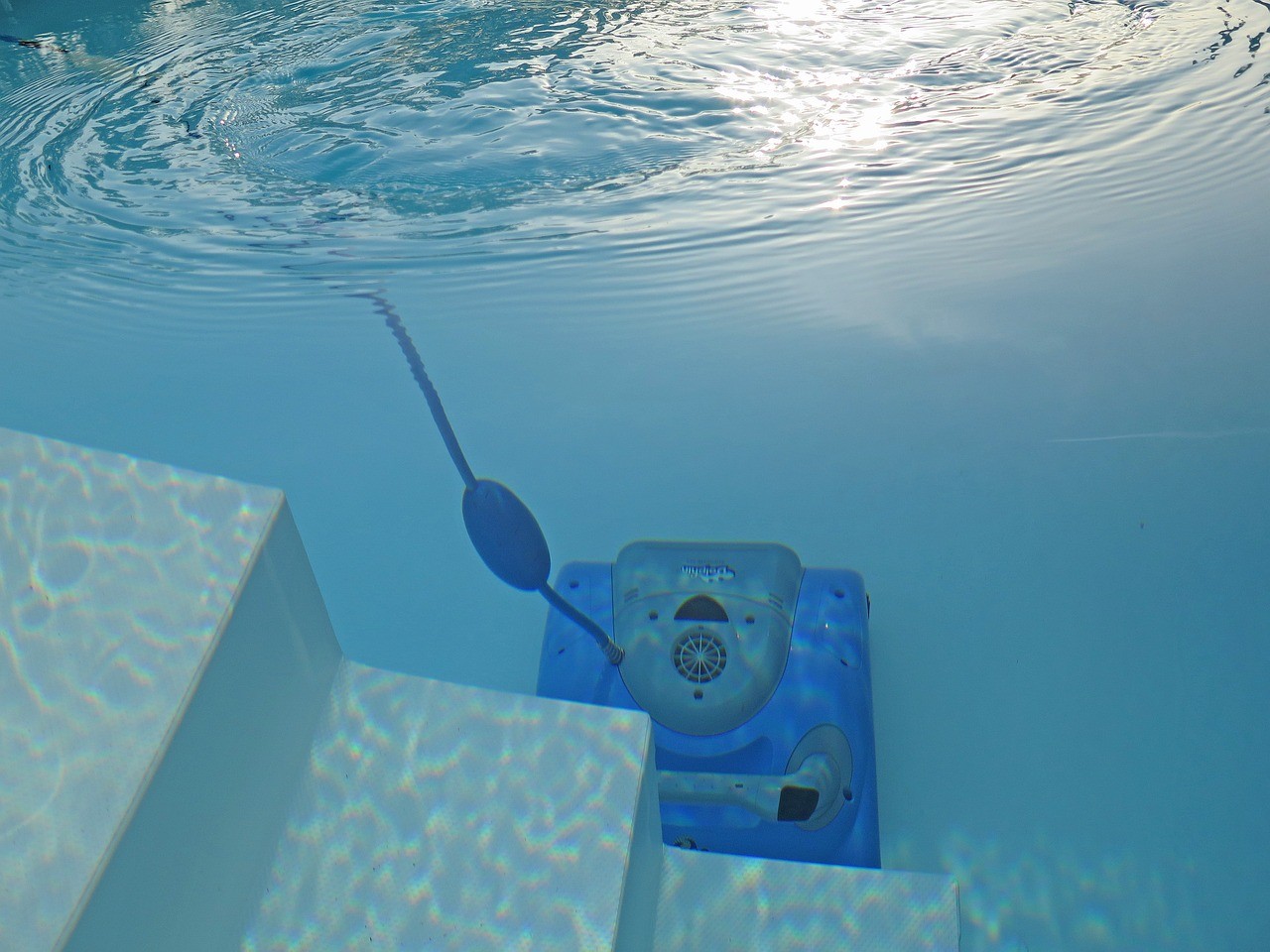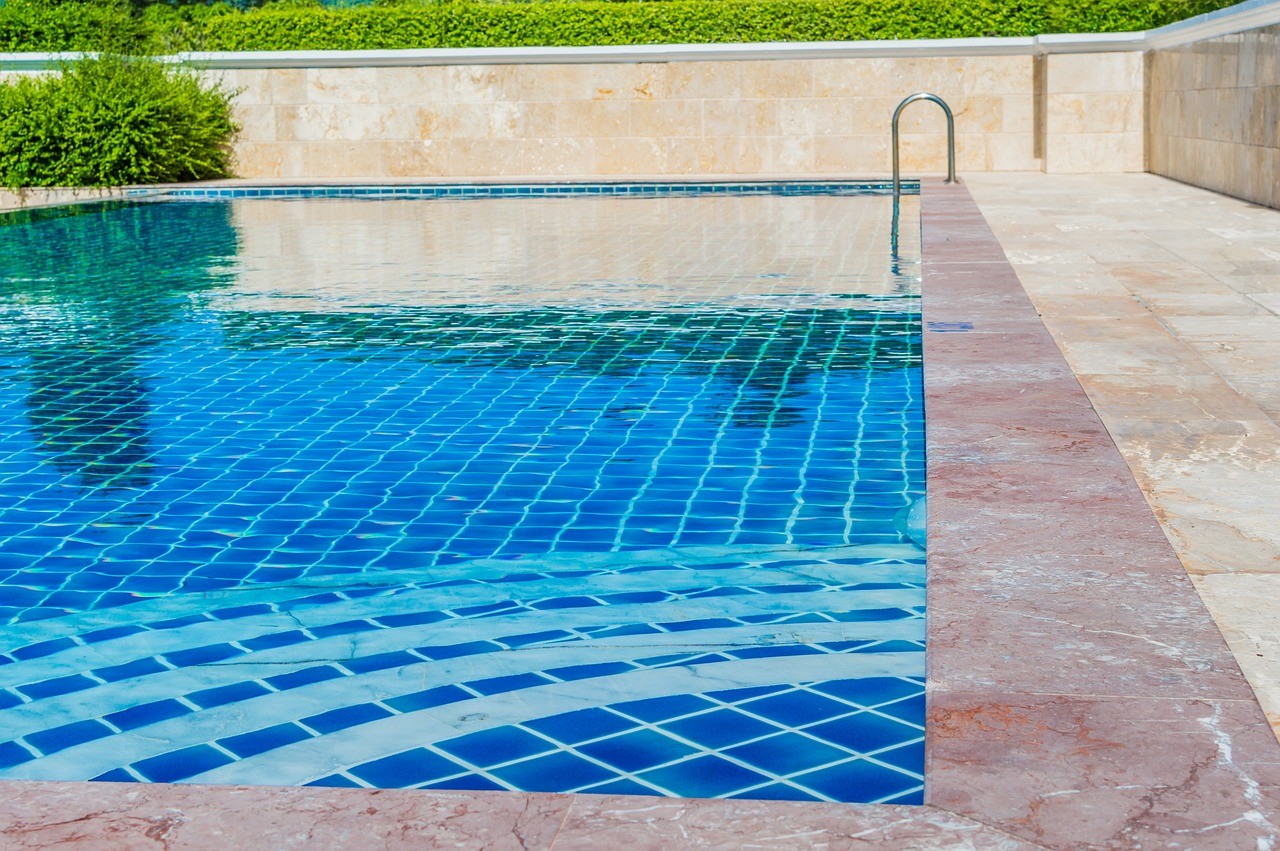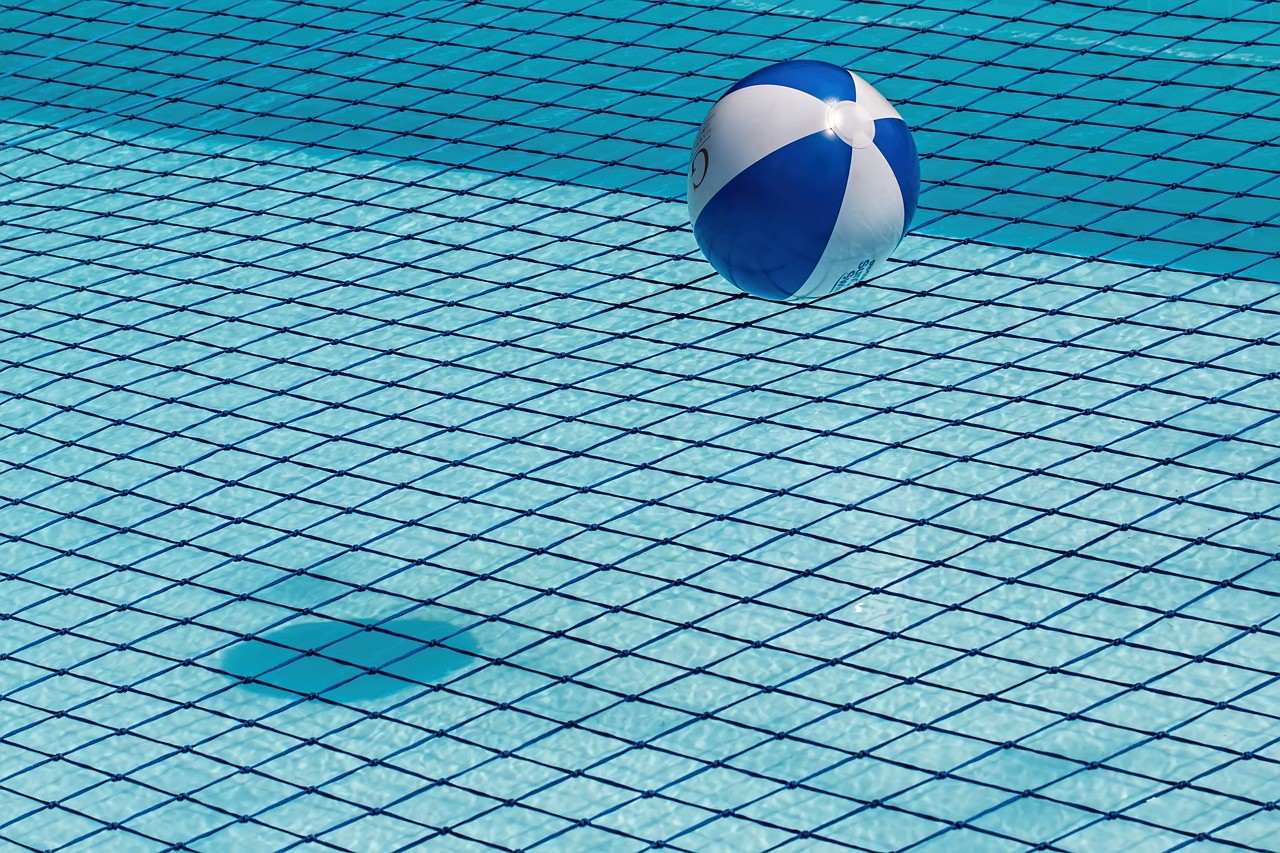Solar Pool Heater
Solar swimming pool heaters make use of solar panels to collect and transfer heat from the sun to pool water.
The water is simply circulated from the pool and into panels where it is warmed before being returned to the pool.
It may seem obvious, but since solar pool heaters are dependent upon the sun to warm up water, they work best in sunny, warm climates.
The majority of pool owners who utilize solar pool heaters also use an auxiliary pool heater at night or on cloudy days.
Pros
- Solar heaters don’t require any additional operating costs.
- They are extremely energy efficient.
- Similar to heat pumps, solar pool heaters are designed to last for decades.
- Solar pool heaters utilize renewable energy and have no emissions whatsoever, making them the most environmentally friendly pool heating option.
Cons
- While inexpensive to operate, solar pool heaters only work well in sunny climates.
- They heat water much slower than other types of pool heaters.
Natural Gas or Propane Pool Heater
If you’re searching for the best pool heater, chances are propane or natural gas pool heater is what you’re looking for as they offer unparalleled heating performance.
With these types of heaters, a combustion chamber is used to warm the water. Water is pumped out of the pool and goes through a super-hot tube before being returned 20, 20, or 30 degrees warmer.
Although propane and natural gas heaters work the best, they can be more costly to run.
Since they work so well, however, you only have to turn them on a few minutes before diving in, rather than hours or days beforehand. This allows you to save some money and provides you with convenience unmatched by any other type of heater.
Pros
- Most gas pool heaters are less expensive than other heating options.
- Gas pool heaters heat up water very quickly, making them ideal for anyone who likes to take short dips.
- As the most popular type of pool heater, there are many models to choose from with solid pool heater reviews.
Cons
- Since they run on electricity and utilize natural gas, gas pool heaters can be costly to operate.
- Most gas pool heaters have an energy efficiency rating of 80-8 percent, making them one of the least efficient pool heating options.
- Due to their reliance on fossil fuels, gas pool heaters aren’t environmentally friendly.
Electric Pool Heater
Electric pool heaters warm up pool water by heating a metal coil, which in turn heats the water. Although electric pool heaters are often less costly and easier to install, they’re also the least efficient.
The amount of electricity needed to heat an entire in-ground or above-ground pool, usually makes them an unwise choice for most pool owners.
While hot tubs and spas typically use electric heaters, they’re much smaller than pools, so they heat up faster and use less energy.
Nonetheless, given their cost of operation, you’re likely better off going with a heat pump or natural gas pool heater.
If you’re thinking of going with an electric heater, make sure to review your utility company’s pricing structure, as rates usually skyrocket after reaching a set limit of kilowatt-hours.
This information isn’t provided in most pool heater reviews, but you’re here for an honest opinion and honesty is what you’ll get.
Pros
- Electric pool heaters are generally less expensive than other types of pool heaters.
- Unlike solar and gas pool heaters, electric pool heaters tend to be easier to install.
- Electric pool heaters don’t release harmful emissions, making them more environmentally friendly.
Cons
- Unlike gas heaters, electric pool heaters take a while to warm up the water.
- Most electric heaters aren’t suitable for large in-ground pools.
Pool Heat Pump
Heat pumps pull in the warm surrounding air and use compressors to optimize the air to the right temperature. They then transfer the heated air to pool water, resulting in an efficient and eco-friendly way to warm up the largest swimming pools.
Heat pumps are generally more expensive than the other types of pool heaters. However, they work extremely well and are capable of heating a pool to a comfy temperature, even when it’s below 50 degrees outside and frost is in the air.
While costlier than natural gas heaters, they work just as well and cost far less to operate, making them a solid option for any pool or spa owner.
Pros
- Heat pumps are very energy-efficient and cost less to operate.
- Most heat pumps are incredibly durable and designed to last for up to 20 years.
- Although they run on electricity, heat pumps don’t produce harmful emissions, making them a more environmentally friendly pool heating option.
Cons
- Heat pumps cost more upfront than other types of pool heaters.
- Unlike gas swimming pool heaters, heat pumps take longer to heat water.
- Since they rely upon outside air to heat the water, heat pumps aren’t ideal for colder, northern climates.
Wood Burning Pool Heater
- Similar to an outdoor furnace, a wood-burning pool heater features a combustion chamber where wood is burned to create heat, which warms up water in a circulation pipe. Although they do their job well, wood-burning pool heaters are quite archaic and inconvenient, requiring pool owners to add fuel to the fire throughout the heating process.
By Usage:
In-ground Pool Heater
- There’s no such thing as an in-ground pool heater per se, but some people choose to classify pool heaters according to the type of pools they’re heating. The truth is heat pumps, natural gas pool heaters, and even some solar heating systems can be classified as in-ground pool heaters.
- Whether or not one of these types of pool heaters is suitable for your in-ground pool largely depends on its BTU output and energy efficiency.
Above-Ground Pool Heater
- Like in-ground pool heaters, almost any type of pool heater can fall into this category. Natural gas heaters, heat pumps, electric heaters, and solar heaters can all be used to warm up above-ground pools.
- That being said, unless you have a huge 40,000-gallon above-ground pool, chances are you’ll be better off going with an electric or solar heating option. If you like the power and performance of natural gas heaters and decide to go that route, make sure to use the pool heater sizing chart to determine how many BTUs your pool requires.
Above-Ground vs. In-Ground Pool Heaters
Whether you have a sprawling in-ground pool or a smaller above-ground version, having a pool in your backyard is a great way to have fun and beat the summertime heat. With a quality pool heater, you can even extend the swim season well into winter and enjoy warming therapeutic waters on brisk days and chilly nights.
However, depending on the type of pool you have, there are some considerations to be made. This pool heater comparison will help shed a little light on the differences between above-ground and in-ground pools.
In addition to being smaller in size, above-ground pools lose heat faster than in-ground pools. Since in-ground pools are surrounded by insulating dirt, they only lose heat from the surface, not the sides.
Above-ground pools, on the other hand, lose heat from the sides as well. Therefore, although they’re typically smaller, above-ground pools require nearly as much power as larger in-ground pools to keep up with their heat loss.
That being said, due to the size of in-ground pools, in-ground pool heaters are designed to utilize higher flow rates to heat larger volumes of water.
So, while two different pool heaters may have the same BTU output, one may have higher flow rates and perform better for in-ground pools.
Any pool heater will add some warmth to your pool. However, if you have a large in-ground pool and an above-ground heater, you may only be able to warm the pool water by 10 degrees or less.
With a larger in-ground pool heater, on the other hand, you can raise the temperature of your pool by up to 30 degrees, regardless of how cold it is outside. Needless to say, if you’re reading pool heater reviews to find the best pool heater, chances are an in-ground pool heater is the way to go.
Pool Heater vs. Heat Pump
If you’re considering installing a new heater for your pool or replacing an old one, you might find yourself in a dilemma.
Should you choose a standard natural gas pool heater or a swimming pool heat pump? There are quality models in both categories capable of heating the largest of pools, but there are some distinct differences between the two that deserve a closer look.
Both heat pumps and pool heaters are designed to effectively heat pools, but they do so in different ways. Traditional gas heaters use natural gas that is piped to the unit.
A propane heater is another option, but they’re more costly than natural gas and you will have to look at a propane tank in your yard each day. Heat pumps, on the other hand, utilize electricity and function much like an air conditioner, except in reverse.
While both types of pool heaters will increase your gas or electric bill, heat pumps are much more efficient, resulting in little to no energy loss.
This, combined with the fact that it takes much longer for a heat pump to begin heating water, means heat pump owners usually leave them running around the clock. By nature, gas pool heaters produce heat extremely quickly but are generally much less efficient. Therefore, individuals with gas pool heaters only run them as needed and turn them off after use.
As mentioned earlier, pool heaters rely on natural gas that must be piped from the street or propane that must be filled.
They also need electricity to power the controls and the spark igniter. Heat pumps, however, only require a 220V electrical line, making them easier and less costly for most pool owners to install.
Due to these differences, many people benefit more from heat pumps in the long run. Although they generally cost more than pool heaters, they’re much more efficient and cost less to operate, even when left running.
On the downside, heat pumps aren’t designed to work well in colder weather. Some heat pumps quit working below 50 degrees, making them fine for residents in Florida or southern California but less useful for those living in colder climates.
If you’re on the hunt for the best pool heater, you really can’t go wrong with either option. Both types of pool heaters have their pros and cons, so consider each of the factors we just discussed, read the pool heater reviews above one more time, and choose the type of heater that best suits your needs, budget, climate, and lifestyle.



